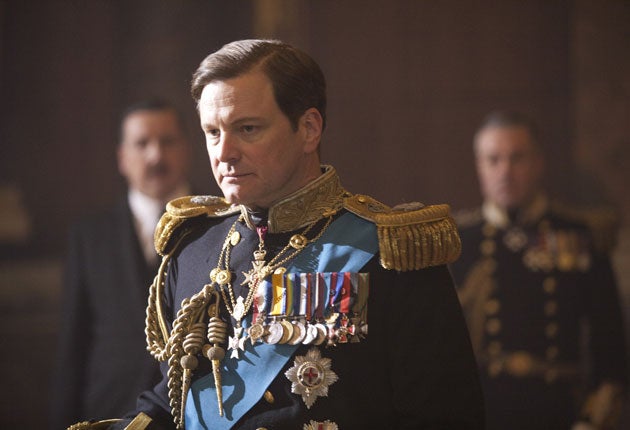The King's Speech (12A): The IoS review
Firth's stammering monarch is a sh-sh-shoo-in for an Oscar nomination

Yes, it's that time of year again, the midwinter window when film companies release their best hopes for Oscar recognition – and there's no way The King's Speech could have come out at any other time.
A sumptuous historical drama that could be seen as a prequel to The Queen or as a sequel to Mrs Brown, it's set in the years just before and just after the death of George V (Michael Gambon). His elder son David (Guy Pearce) is more interested in a certain American divorcee than he is in "kinging", so David's brother Bertie (Colin Firth) may have to accept what he views as the most poisonous of poisoned chalices. Having lived with a severe stammer since childhood, he thinks of microphones as instruments of torture, but for a monarch in the radio age, there's no avoiding them. As a last resort, his devoted wife (Helena Bonham Carter) takes him to a Harley Street specialist (Geoffrey Rush), even though he's – shudder – an Australian who insists on discussing his clients' – shudder – feelings.
In short, The King's Speech couldn't be a better bet at awards season if the producers handed each voter a brown envelope stuffed with unmarked notes. With more stately homes than the National Trust, and as many respected thesps as the Harry Potter franchise, it's a reassuring tale of love conquering all, of friendship and determination overcoming any disability, and of the privileged being born to rule, just as long as a commoner reminds them to soften their stiff upper lips occasionally.
Still, none of this carping changes the fact that The King's Speech is a delightful film. For a while, David Seidler intended his script to be staged as a play, and while Tom Hooper (The Damned United) keeps the pageantry colourfully cinematic, it has the rich characterisation and the long scenes of odd-couple verbal sparring that you'd expect from a first-rate theatrical two-hander. Bonham Carter is a joy as the tender yet sardonic Elizabeth, and the Oscar-bound Firth is both heart-rending and remarkably funny in his best ever role. It's all done so expertly that you can forgive the film's ultimate message: Britain won the war because a toff gave a halfway competent radio broadcast.
Join our commenting forum
Join thought-provoking conversations, follow other Independent readers and see their replies
Comments
Bookmark popover
Removed from bookmarks